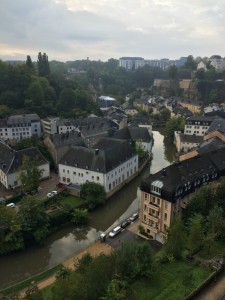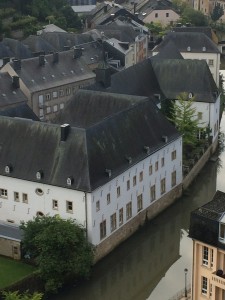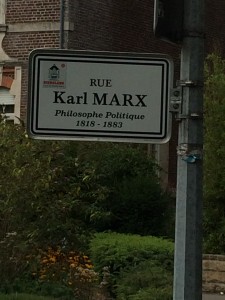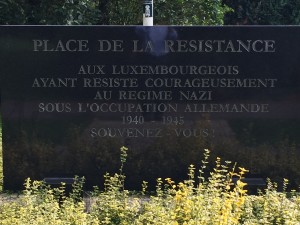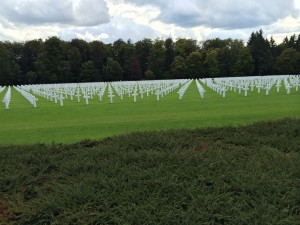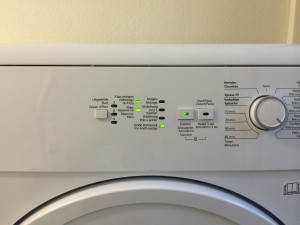This morning I went to the farmers market in Luxembourg City. After I had purchased the items I came to get, I decided to buy a few Italian pastries. Once again, I got in trouble speaking Italian. I wanted to say “these” but I didn’t know the word in French so the Italian just came out without thinking. The couple running the booth were Italian. Of course. Once they heard me speak one word of their native tongue, it was like we were old friends. The woman was particularly good at sales. She would give me samples. While I was tasting them, she would detail the effort that went into each cheese or meat. Unlike CostCo where you can eat your samples and move on, I felt compelled to buy some of the cheese and prosciutto. I’m sure she saw me coming, as they say. Oh well. There are worse things to throw away money on than cheese and ham.
After that, I spent a couple of hours after the farmers market walking around the city. The city is quite hilly and has some spectacular views:
There are signs everywhere for the train station (there’s only one for the whole city), so it’s easy to get back no matter how far you wander. It’s a little less easy to get to somewhere in particular. My GPS is almost worthless here, perhaps because of the switchback roads along the hills, and there’s no consistent street signage. Whereas in the older parts of say Torino and Nice the street signs are on the corners of buildings, here they might be on the building or they might be on a pole or they just might not be (unless I missed them). There seem to be far more signs pointing you toward something rather than indicating where you are.
I came home for lunch around 1pm. I still had a valid train ticket so I decided to go to Dudelange, the third most populous city in Luxembourg after Luxembourg City and Esch-sur-Alzette (both of which I had been to). This does not mean that Dudelange is a big city; after all, Differdange is the fourth most populous city. According to Wikipedia, the populations of the four biggest cities were 76,420; 27,14; 17,320; and 10,248 in 2001. Even if those numbers have increased, the ratio between the cities has not. There is a huge drop in population between Luxembourg City and Esch. The population of Dudelange is not that much more than the number of Miami students in Oxford. Anyway, I got off at one stop in Dudelange and back on at another. The city closes off the main shopping street on Saturday afternoons, which is nice, although the drivers here are very much aware of pedestrians. Shortly after I left the station, I was greeted by this street sign:
After that auspicious beginning, things went, well, not down hill, but just not different than what I had seen elsewhere. I walked around but it didn’t seem much different than Differdange (not a slight). I did happen across a little park near the train station from which I left Dudelange:
I don’t think I’ve ever felt the presence of WWII as much as I have here. Notice the command at the end: Remember!
I forgot to mention earlier that we went to the Luxembourg American Cemetery and Memorial where over 5,000 US soldiers are buried, including General Patton.
From the profound to the trivial…
So now I am going to do what every American professor does in Europe: laundry and work for my classes. Yep, living the vida loca over here.
Update: I’m back with another laundry story or two. The machines do not start right away, so I like to hang out until I know that they’re actually going to be doing something. As you might imagine, there’s not much of interest in a laundry room. As I’m looking around, I notice that the dryer does not vent outside. Before you tell me about how people do this in the winter to warm up their basements and add moisture to their houses, this isn’t that. The room doesn’t feel particularly warm or humid. In fact, I can barely feel the air coming out of the dryer (someone else was using it).
Now it’s my turn to use the dryer and…it won’t start. Here’s the control panel:
The two indicator lights on the left that are on I suspect are telling me something. I know that rein in German means pure or clean, so I take a wild guess that “Filter reinigen” means clean the lint trap in Dutch. I know this isn’t German because the other light is telling me water reservoir vol, which isn’t German. The first two words are clear enough. The last one is almost the German word for full (voll) but I’ve never heard of a dryer with a water reservoir. Having no better idea about what to do, I poke around the machine until I find—you guessed it—a water reservoir, somewhat like a smaller version of what’s in a dehumidifier. And guess what? It was full of water! I guess that explains where the water goes if it isn’t sent outside. I dump it out and I’m back in business! Who knew that doing laundry could be such an adventure.
